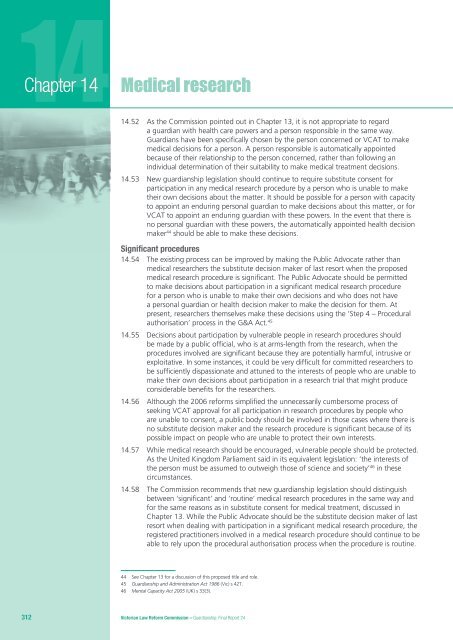Medical research - Victorian Law Reform Commission
Medical research - Victorian Law Reform Commission
Medical research - Victorian Law Reform Commission
You also want an ePaper? Increase the reach of your titles
YUMPU automatically turns print PDFs into web optimized ePapers that Google loves.
Chapter 14<br />
<strong>Medical</strong> <strong>research</strong><br />
14.52 As the <strong>Commission</strong> pointed out in Chapter 13, it is not appropriate to regard<br />
a guardian with health care powers and a person responsible in the same way.<br />
Guardians have been specifically chosen by the person concerned or VCAT to make<br />
medical decisions for a person. A person responsible is automatically appointed<br />
because of their relationship to the person concerned, rather than following an<br />
individual determination of their suitability to make medical treatment decisions.<br />
14.53 New guardianship legislation should continue to require substitute consent for<br />
participation in any medical <strong>research</strong> procedure by a person who is unable to make<br />
their own decisions about the matter. It should be possible for a person with capacity<br />
to appoint an enduring personal guardian to make decisions about this matter, or for<br />
VCAT to appoint an enduring guardian with these powers. In the event that there is<br />
no personal guardian with these powers, the automatically appointed health decision<br />
maker 44 should be able to make these decisions.<br />
Significant procedures<br />
14.54 The existing process can be improved by making the Public Advocate rather than<br />
medical <strong>research</strong>ers the substitute decision maker of last resort when the proposed<br />
medical <strong>research</strong> procedure is significant. The Public Advocate should be permitted<br />
to make decisions about participation in a significant medical <strong>research</strong> procedure<br />
for a person who is unable to make their own decisions and who does not have<br />
a personal guardian or health decision maker to make the decision for them. At<br />
present, <strong>research</strong>ers themselves make these decisions using the ‘Step 4 – Procedural<br />
authorisation’ process in the G&A Act. 45<br />
14.55 Decisions about participation by vulnerable people in <strong>research</strong> procedures should<br />
be made by a public official, who is at arms-length from the <strong>research</strong>, when the<br />
procedures involved are significant because they are potentially harmful, intrusive or<br />
exploitative. In some instances, it could be very difficult for committed <strong>research</strong>ers to<br />
be sufficiently dispassionate and attuned to the interests of people who are unable to<br />
make their own decisions about participation in a <strong>research</strong> trial that might produce<br />
considerable benefits for the <strong>research</strong>ers.<br />
14.56 Although the 2006 reforms simplified the unnecessarily cumbersome process of<br />
seeking VCAT approval for all participation in <strong>research</strong> procedures by people who<br />
are unable to consent, a public body should be involved in those cases where there is<br />
no substitute decision maker and the <strong>research</strong> procedure is significant because of its<br />
possible impact on people who are unable to protect their own interests.<br />
14.57 While medical <strong>research</strong> should be encouraged, vulnerable people should be protected.<br />
As the United Kingdom Parliament said in its equivalent legislation: ‘the interests of<br />
the person must be assumed to outweigh those of science and society’ 46 in these<br />
circumstances.<br />
14.58 The <strong>Commission</strong> recommends that new guardianship legislation should distinguish<br />
between ‘significant’ and ‘routine’ medical <strong>research</strong> procedures in the same way and<br />
for the same reasons as in substitute consent for medical treatment, discussed in<br />
Chapter 13. While the Public Advocate should be the substitute decision maker of last<br />
resort when dealing with participation in a significant medical <strong>research</strong> procedure, the<br />
registered practitioners involved in a medical <strong>research</strong> procedure should continue to be<br />
able to rely upon the procedural authorisation process when the procedure is routine.<br />
44 See Chapter 13 for a discussion of this proposed title and role.<br />
45 Guardianship and Administration Act 1986 (Vic) s 42T.<br />
46 Mental Capacity Act 2005 (UK) s 33(3).<br />
312<br />
<strong>Victorian</strong> <strong>Law</strong> <strong>Reform</strong> <strong>Commission</strong> – Guardianship: Final Report 24
















